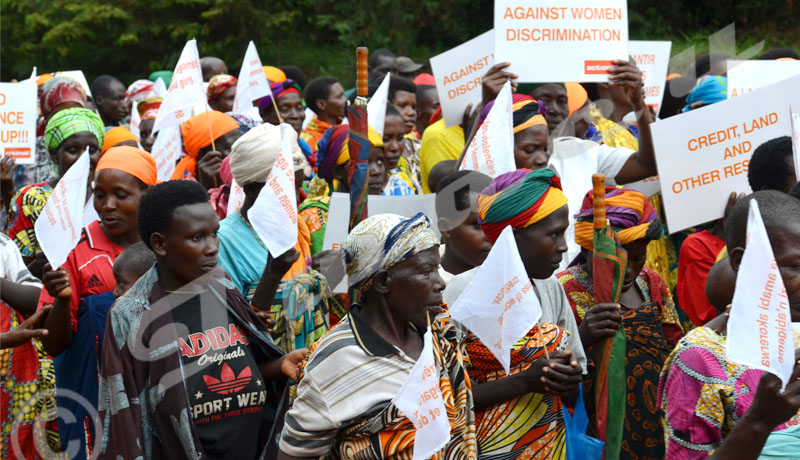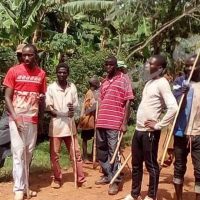From November 29 to December 5, the NGO-ActionAid, organized a series of activities as part of the campaign of 16 days of activism against violence inflicted on women and girls. The mobilization during this period was an opportunity to call on all stakeholders to eradicate this scourge which is rife in the Burundian society.

Mrs Marie Béata Musabyemariya, during the opening of the workshop.
The mobilization activities around a conference-debate were opened in Bujumbura, by Mrs Marie Béata Musabyemariya, Country Director of ActionAid and continued in Ruyigi and Butaganzwa communes (in Ruyigi province).
Thousands of representatives from women’s organizations of Ruyigi, Karusi, Rutana, Bujumbura and the capital held marches with messages calling to fight against Sexual and Gender Based Violence. Several national and local authorities had participated in community mobilization and ceremonies.
In her opening speech, Mrs. Béata Musabyemariya, Country Director of ActionAid sent out a cry of distress.”It’s up to all of us to stand up and forever fight against this scourge that threatens the social fabric”. “As household pillars, we have prioritized the protection of women in the course of their daily businesses,” she explained.
The campaign of these 16 days of activism was conducted under the theme:”Fight against Gender Based Violence in the world of work”.
“This is an opportunity to call for the respect for the rights of women who work in informal sectors”.
In the face of violence and other forms of discrimination they are victims of, women still have a difficult task to successfully fight against violence inflicted on them.
Some categories of women live by doing precarious businesses such as the street trade or indecent profession like prostitution. They live in poor conditions which do not allow them to earn a decent living, said Francine Manirambona, mother of 5 children who lives in Nyabagere area in Kamenge District.
She is an avocado seller and has no fixed point of sale. “We are most often victims of daily police raids. They take all our goods when they come. I realized that it isn’t worth continuing with my small business anymore,” she says adding that she has opted for prostitution to feed her children.
“It’s a risky business. “In addition to stigma in the neighborhood, the risk of being infected with AIDS and other sexually transmitted diseases is high,” she adds.
Mrs Béata deplores the choice made and says “it’s a signal that if nothing is done, the risk that these bad practices generate serious consequences will be great”.
Networking, a necessity…
Often obliged to turn to prostitution due to the lack of other sources of income, disadvantaged women have no other options such as accessing credit for running other businesses. Participants converged on the need to join associations so that their voice can reach far.
“If they come together, microfinance institutions will consider their strength when they ask for credits,” said Lydwine Nimbona, who is charged with protecting widows, orphans and other vulnerable groups within the Collective of women’s organizations-CAFOB.
As for other cases of sexual violence occurring in many localities of the country, Marc, a teacher at Muriza Fundamental School in Butaganzwa commune (Ruyigi province) finds that the eradication of violence will be difficult unless there is a strong investment of efforts at all levels.
“I particularly call upon faith-based organizations to play a greater role as those in charge of conscience. The clergy must be involved in eradicating gender-based violence more than ever before,” he says.
For him, worship areas are the most appropriate places for raising awareness and denouncing gender-based violence. “The government should show its determination by imposing “severe sanctions against men who are involved in concubinage,” he adds.
In the same sense, for teachers who abuse their positions to ask sexual favors to their students, “their superiors must be exemplary by punishing the perpetrators of these practices”.
In this context, he appreciates the measure taken by the Minister of Education that allows girls who become pregnant while they are still at school, to return to school after they have given birth.” It’s a major step forward in the fight against taboos and the stigma attached to gender-based violence “.
Severely punish perpetrators

Women’s associations in Butangwanza commune held a march chanting anti-GBV slogans.
“Local officials are sometimes bribed to stifle the prosecution of crimes. It is unfortunately a situation that is often observed in some provinces,” says Laetitia Mbazumutima, a resident of Nyangurube hill in Butaganzwa commune of Ruyigi western province.
After being constantly beaten by her husband, she complained.”But every time he got imprisoned, he was released the next day. Afraid of being killed, I fled my home,” she says.
Socio-cultural barriers are another setback in the eradication of SGBV. The Administrator of Butaganzwa commune makes an appeal to all of the victims who are still afraid of filing a complaint because of fear of reprisals. “The perpetrators of rape will be prosecuted. You should be courageous enough to report cases of rape to competent authorities,” he said before reassuring that victims must know that no matter how long it may take, justice ends up catching the perpetrators. It is crucial that everyone be involved, especially community activists. To overcome this fear, the population must talk about it”.
Mrs. Gloriose Nimenya, Member of Parliament elected in Rumonge province and responsible for gender issues in the National Assembly, recalled the step already taken in the fight against GBV. She reiterated the involvement of everyone in the eradication of sexual and gender-based violence.”Women should understand that it will be difficult to put an end to violence against them as long as they remain scattered, without unified effort. They are the ones who must be the agents of change.
Administrative authorities will support their effort,” she says.
MP Nimenya calls on those women to claim their rights by asking the fair implementation of different laws already in force. “Women are the pillar of the households. The authorities must protect them at all costs because, when a woman is beaten, raped, it is the whole life of the household that is threatened. “It is also the economy of the whole country that is undermined,” she says, adding that the new law on gender-based violence should be popularized and implemented”.
These sixteen days of activism ended on December 10, a date coinciding with the celebration of the Human Rights Day.



















 IWACU Open Data
IWACU Open Data

